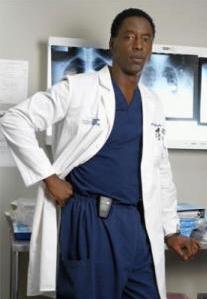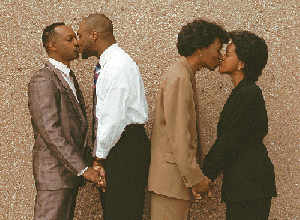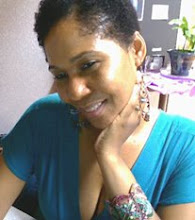Anatomy of Black and Gay Conflict**
 I’m not a fan of television. In fact, my 24-inch TV set has been unplugged for four months, and is currently a storage unit for the five or six DVDs that I own.
I’m not a fan of television. In fact, my 24-inch TV set has been unplugged for four months, and is currently a storage unit for the five or six DVDs that I own.I have never watched an episode of Grey’s Anatomy. Last fall when I heard that Isaiah Washington called his castmate T.R. Knight a “faggot,” and read about the ensuing outrage in the gay community, I made two immediate assumptions. White folks were trying to lynch a brother and bring down a highly successful show created by a black woman, and “faggot” had nowhere near the negative cultural and historical connotations as “nigger.” In short, gay people, get over yourselves.
Earlier this week, in the Golden Globes pressroom, Washington denied ever using an anti-gay slur against his castmate, saying, “No, I did not call T.R. a faggot. Never happened.” Now GLAAD (the Gay & Lesbian Alliance Against Defamation) is calling for a formal apology from the actor, and gay rights activists have proposed boycotting ABC until he gets the axe. Washington was recently nominated for an NAACP Image Award, and many are demanding that the honor be rescinded.
As I read about GreyGate in the black blogosphere and discuss the issue among some of my friends, the consensus is that blackness is more visible than gayness, more marginalized. Thus, gay people can’t fathom our struggle, nor should they attempt to equate it with their own. After all, a gay person can walk into a room and have the option or “flaunting” his or her sexuality or not, whereas blackness – pigment, phenotype -- is a constant badge of dishonor. Why are “they” always trying to shove the “gay agenda” down our collective throat? Couched within “intellectual” debate about race and sexuality is the notion that gay people should remain in the shadows and in their “place.”
I have never written about gay issues. Whenever I hear about same-sex marriage, gay adoption, gay rights, hell, whenever I see a rainbow decal on the bumper of a car, some emotion simmers beneath the surface, which at its best is fear, and at its worst is hate. I would never consider myself homophobic, and yet, I have to confront the fact that I must be.
Since I read about Washington’s on-set outburst four months ago, and then heard about the actor’s second “outing” at the Golden Globes on Monday, I have had a serious wake-up call, the shifting of a long-held belief system. I am forced to re-examine how I interact with the gay people in my life. I must admit, those friendships have been compartmentalized and superficial. I am thrilled to have gay homies who I can kick it with, shop with, who can do my hair and makeup, tell me how fierce I am, who can even console me when I talk about my dating woes … but please don’t share your life with me, your gay-identified life. We can share curling irons and M.A.C. lip glass, but please don’t kiss and tell. I am ashamed to admit that I was not a friend, because as Alice Walker says, “No person is your friend (or kin) who demands your silence, or denies your right to grow and be perceived as fully blossomed as you were intended.”
What’s behind the homophobia that I and many other blacks feel? As a thinking woman, and Christian at that, shouldn’t I be more tolerant and understanding of folks whose lifestyles differ from my own? As a black woman, someone who daily dwells on society’s fringe, shouldn’t I empathize with others who are also invisible?
 I can’t claim that Christianity is behind my fear of forming intimate, loving and healthy relationships with gay people. If anything, my religious beliefs are beginning to inform how I view gays and lesbians, and propel me toward acceptance. A few days ago when I realized that I no longer sided with Isaiah Washington in his McBeef with T.R. Knight, I did some research on black homophobia from the perspective of Christian writers and scholars. I’m beginning to understand that blacks assume a colonizer/colonized role when they view gays as “other,” and attempt to deny them rights that they themselves fought hard to attain. Michael Eric Dyson, a scholar and ordained Baptist minister, wants us to resist this way of thinking. “Ironically enough, blacks identify with mainstream sexual values – the very mainstream that has censored and castigated black heterosexuality – when they practice homophobia,” Dyson says. “I am not arguing that homophobia has no homegrown black varieties; I am simply suggesting that such homophobia allows blacks to forge solidarity with a culture that has excluded them.”
I can’t claim that Christianity is behind my fear of forming intimate, loving and healthy relationships with gay people. If anything, my religious beliefs are beginning to inform how I view gays and lesbians, and propel me toward acceptance. A few days ago when I realized that I no longer sided with Isaiah Washington in his McBeef with T.R. Knight, I did some research on black homophobia from the perspective of Christian writers and scholars. I’m beginning to understand that blacks assume a colonizer/colonized role when they view gays as “other,” and attempt to deny them rights that they themselves fought hard to attain. Michael Eric Dyson, a scholar and ordained Baptist minister, wants us to resist this way of thinking. “Ironically enough, blacks identify with mainstream sexual values – the very mainstream that has censored and castigated black heterosexuality – when they practice homophobia,” Dyson says. “I am not arguing that homophobia has no homegrown black varieties; I am simply suggesting that such homophobia allows blacks to forge solidarity with a culture that has excluded them.”We recently celebrated MLK’s birthday, but it would probably surprise some African-Americans to learn that Martin Luther the King and his wife, Coretta Scott King, believed that gay people were also entitled to civil rights. Speaking before the 30th anniversary of her husband’s assassination, Coretta said, “I still hear people say that I should not be talking about the rights of lesbian and gay people and I should stick to the issue of racial justice. But I hasten to remind them that Martin Luther King Jr. said, ‘Injustice anywhere is a threat to justice everywhere.’ I appeal to everyone who believes in Martin Luther King Jr.’s dream to make room at the table of brother- and sisterhood for lesbian and gay people.”
How is any real coalition building between blacks and gays going to take place, any real healing, when there is a lack of trust, truth and tolerance? Many sisters feel hurt and victimized by the down low phenomenon, and view black men as “suspect’ – guilty until proven innocent. Therefore, these women are unable to understand or empathize with the subjugation that gay men may face. Many black men either fetishize lesbians or view them as pitiful women who can’t land a man, or who were abused by men. There is latent superiority on the part of both black men and women toward our gay counterparts. I think that secretly, many blacks resent gays being able to mobilize and shut down the systems that seek to oppress them, hence comments like “The gay mafia is after Isaiah,” and “Fags run Hollywood.”
In the vernacular, the term “family” means that gays recognize, claim and are interconnected with other same-sex oriented people – in spite of differences. Cornel West, grandson of a Baptist minister, and a professor of religion at Princeton University, implores blacks to embrace this same spirit of diversity, and be wary of mindsets that diminish the humanity of others, or trample on their rights. West writes in Race Matters, “Instead of authoritarian sensibilities that subordinate women or degrade gay men and lesbians, black cultural democracy promotes the equality of black women and men and the humanity of black gay men and lesbians. In short, black cultural democracy rejects the pervasive patriarchy and homophobia in black life.”
The pervasive patriarchy West is referring to has its roots in the church. Some black Christians are unable to reconcile “Homosexuality is a sin,” with “Love thy neighbor as thyself.” And if they are tolerant of gay people, they may “love the sinner, but hate the sin.”
I recently got into a verbal sparring match with another believer when I announced that I no longer believe being gay is a sin. I pray my Christianity card doesn’t get revoked, but I didn’t feel “convicted” for making that pronouncement. In fact, it was quite liberating. As Dyson says, “We can affirm our re-created goodness through discourses of redemption open to all human beings. There is no asterisk in the biblical promise of redemption that excludes homosexuals. We have to reclaim the primordial goodness of God that ultimately took human form in Jesus. As they say in Christian circles, God didn’t make any junk, and that means whomever God has made, whether homosexual or heterosexual, is a good person.”
I’m working on becoming that good person. I’m no longer going to expect gay people to change to make me feel comfortable, but I’m transforming myself into the very image of love and acceptance that I seek. I realize that such revolutionary practices are not going to occur overnight. Did I write in to demand that Isaiah’s NAACP Image Award nom be withdrawn? No, but if you’d care to complain, the e-mail address is imageawards@naacpnet.org. Am I boycotting ABC and Grey’s Anatomy? I’m doing that by default, seeing how my television hasn’t been plugged in for the last four months. But seriously, I strive for authentic change. How clichéd and unfair of me to have my Driving Miss Daisy moment, proclaiming to the gay people in my life -- who have supported me unconditionally, whom I have not supported in return, not spoken for, not cared about intimately, not loved – “You’re my best friend!”
In the midst of these ruminations, I received a text message from a gay Filipino friend. His father died two hours earlier, and he had a simple request: to keep him and his family in my prayers. That request humbled me, and brought me to tears. I prayed for him and also for myself, that he could forgive me for all the times I regarded him as “other,” and not brother, for all the times I didn't love him as he loved me. We are interconnected. I am in his "family,” and he’s in mine.
** for DP and GRF


